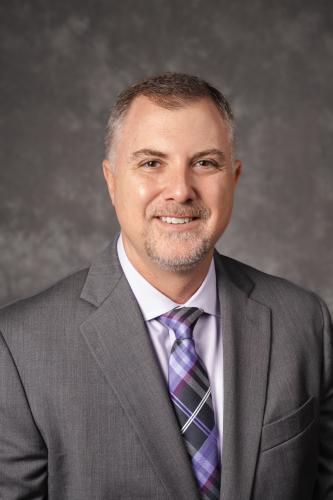NACOGDOCHES, Texas — Stephen F. Austin State University has named Dr. Forrest Lane, an educator with nearly 20 years in a variety of academic and administrative positions within higher education, dean of the Office of Research and Graduate Studies.
“I am genuinely excited about joining the SFA community,” Lane said. “Stephen F. Austin State University has been a significant resource to our state and region for 100 years. Since its founding as a normal college in 1923, it has become an institution with a deep legacy and rich tradition of supporting Texas. It is a privilege to be selected as dean of research and graduate studies, and it’s important to me that I come into this role willing to listen and represent the needs of our students, faculty, staff, and community partners. I look forward to supporting SFA’s continued success.”
Lane comes to SFA from Sam Houston State University, where he served as a professor in the Department of Educational Leadership as well as associate dean of graduate studies and research in the College of Education. At SHSU, he has been an education faculty member since 2015 and has held various administrative roles there since 2017, including program coordinator, assistant department chair and full-time chair.
Prior to his time at SHSU, Lane worked as assistant director and director for student development services at Texas Christian University beginning in 2006 and then in various academic capacities at the University of North Texas and the University of Southern Mississippi until 2014.
He received a Bachelor of Science in political science from Texas A&M University in 2001, a Master of Education in higher education from UNT in 2007, and a Doctor of Philosophy in educational research from UNT in 2011.
“I feel fortunate to have Dr. Lane join the Lumberjack family,” said Dr. Lorenzo Smith, SFA provost and executive vice president for academic affairs. “He will be able to make an immediate, positive impact on students, staff and faculty. With his extensive work in higher education and knowledge of the graduate studies and research support fields, Dr. Lane is the right person to inspire and empower our students and faculty to achieve excellence in advancing learning, innovation, discovery and creative activity at SFA.”
Lane has received nearly a dozen awards and accolades, including Faculty Fellow from the Greater Texas Foundation and two Faculty Excellence Awards from SHSU. He has contributed to three published books, completed 26 peer-reviewed journals, and given 78 academic presentations and workshops. Additionally, he’s been a part of 11 successfully funded grant projects.
SFA’s Office of Research and Graduate Studies is responsible for overseeing all of the university’s more than 40 master’s and four doctoral degrees, as well as supporting research grants and sponsored programs for faculty members. It supports student and faculty academic research of any kind, hosting such events as the Graduate Research Conference and Undergraduate Research Conference.
Lane’s goals for fostering a culture of research excellence and innovation at SFA will begin by recognizing the work already underway by campus and community partners.
“Research and creative scholarly activity are important components of higher education,” Lane said. “They enhance our understanding of critical problems, which then informs and supports high-quality teaching. They also ensure our institution remains relevant in a rapidly changing world.”
Strategies Lane said will be important as SFA builds a culture of research excellence include increasing research visibility, expanding research capacity, fostering interdisciplinary research and leveraging areas of research strength.
Lane also aims to support graduate enrollment growth in ways “that fit within the context of SFA,” he said. “It is my priority to ensure that we are working collaboratively with graduate programs and departments to identify solutions that are most appropriate for them.”
Immediate steps that can help position SFA for success, Lane added, include establishing criteria for program viability, identifying programs with potential for growth, expanding marketing and recruitment efforts, increasing program access, and focusing on graduation student success.
“A top priority is learning more about our graduate student experience,” Lane said. “Institutions have many great resources, but students do not always know what resources exist or how to access them. We need to ensure students can take full advantage of what we already offer. I am also aware our students are navigating increasingly complex lives. We need to ensure our existing resources meet the needs of our graduate students and that we have mechanisms that allow students to easily share those needs so they have a voice at our institution.”
Lane will begin in his position as SFA’s dean of research and graduate studies in January after he and his family, including wife, Sarah, and three children, relocate to Nacogdoches.
To learn more about SFA’s Office of Research and Graduate Studies, visit their website.
ABOUT STEPHEN F. AUSTIN STATE UNIVERSITY
Stephen F. Austin State University, the newest member of The University of Texas System, began a century ago as a teachers’ college in Texas’ oldest town, Nacogdoches. Today, it has grown into a regional institution comprising six colleges — business, education, fine arts, forestry and agriculture, liberal and applied arts, and sciences and mathematics. Accredited by the Southern Association of Colleges and Schools, SFA enrolls approximately 11,000 students while providing the academic breadth of a state university with the personalized attention of a private school. The main campus encompasses 421 acres that include 37 academic facilities, nine residence halls, and 68 acres of recreational trails that wind through its six gardens. The university offers more than 80 bachelor’s degrees, more than 40 master’s degrees and four doctoral degrees covering more than 120 areas of study. Learn more by visiting the SFA website.
 Axe ’Em, Jacks!
Axe ’Em, Jacks!
